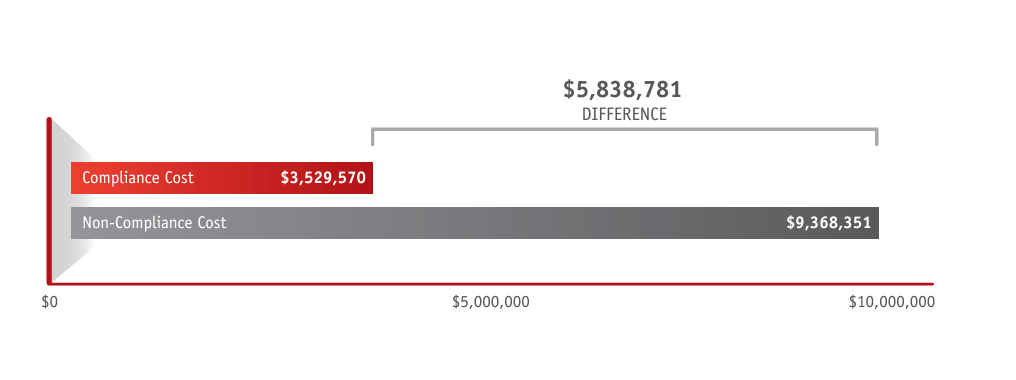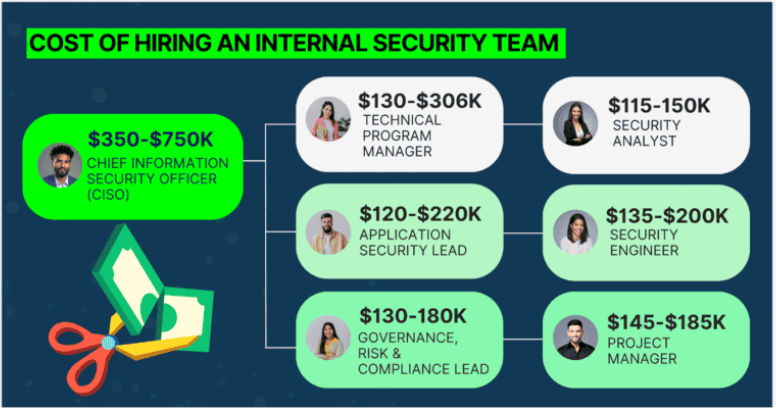Top 5 Reasons Security Consulting is Good for Business

The growing cybersecurity market
“Cyberattacks are proliferating, causing trillions of dollars of damage every year. The cybersecurity industry has a chance to step up and seize the opportunity.” McKinsey & Company
In today’s age of sophisticated cyber threats, the security services and technology market is growing at an exponential rate – it’s total addressable market will soon reach $2 trillion. This just means that with the average global price of a breach skyrocketing at USD 9.48 million in 2023 it’s just going to continue to grow, and who wants to get caught with that kind of hit to the bank account. This is where security analysts and consulting firms can step in with strategic advisory services to help ensure businesses are protected from these advanced threats, preventing financial losses and reputational harm, and reinforcing the protection of sensitive data.
The rising threatscape
There are many factors that come into play when establishing security programs in today’s digital landscape. With 48% of organizations noting a rise in cyberattacks alongside the existing cybersecurity skills gap, a clear imperative arises for organizations to look to external security experts for assistance. External cybersecurity firms offer objective advice from industry experts who are well-versed in major issues, thanks to their work with a diverse range of clients across various industries.
The financial impact of cyberattacks
These firms are uniquely positioned to navigate organizational obstacles and politics. The demand for cybersecurity services is at a critical point in the face of the “current rate of growth, damage from cyberattacks will amount to $10.5 trillion annually by 2025“. Businesses pursuing new opportunities must prioritize cybersecurity from the outset, especially as 81% of consumers consider data safety crucial.
The role of security consulting

Cybersecurity consulting plays a vital role in comprehensive security planning and project management, ensuring operational resilience amid evolving threats within business innovation strategies. Consultants pinpoint weaknesses and vulnerabilities, crafting tailored security approaches and controls to address security risks and compliance demands. This includes the review and creation of security policies to fill security gaps and ensure compliance. Leveraging their wealth of experience, cybersecurity consulting services facilitate informed decision-making to establish robust security frameworks and enhance cyber resilience. Given the increasingly complex regulatory landscape, organizations benefit greatly from external expert guidance.
Key benefits of a security consultant
- Engaging cybersecurity consultants leads to enhanced protection of sensitive data and intellectual property, significantly improving a company’s overall security posture.
- Cybersecurity consultants offer customized solutions that are tailored to the specific needs of the business, while also aligning security strategies and security practices with the client’s brand and culture.
- Businesses gain access to deep cybersecurity expertise, the latest cybersecurity trends, and innovations, providing your business with a competitive edge in cyber defense.
- Cost savings is an advantage of working with a cybersecurity consultant, as businesses can tap into a full security team at less than the cost of a full time hire.
What does a security consultant do anyway?
A cybersecurity consultant provides a combination of people and processes for strategic and comprehensive security programs. They are experts in their field, staying current with global and regional data protection laws, such as GDPR, CCPA, and PCI, advising on compliance and best practices. Identifying weaknesses in organization’s security measures, as well as review existing information security controls, providing solutions to mitigate risks.
They collaborate with the leaders in security at various companies to develop dynamic solutions to security challenges and craft roadmaps that protect and enhance your business operations in a secure digital ecosystem.
Five critical pain points when it comes to combatting security risks
As security consultants, we’ve seen a lot and spoken to many of our customers to help identify the top five reasons businesses are hiring external cybersecurity vendors to conduct a comprehensive risk assessment and enhance their security programs.

1. Lack of in-house expertise for advanced threat detection and security posture
Organizations are struggling with the serious shortage of skilled cybersecurity professionals. This gap leaves you vulnerable to sophisticated security threats, as existing teams may not have the technical expertise to combat these evolving threats.
Continuous training and awareness programs are also essential to keep employees updated on the latest threats and cybersecurity best practices, another challenge for many organizations to maintain.
Fortinet’s 2023 report reveals that 93% of participants reported board inquiries regarding cybersecurity, with 83% recommending a boost in IT security personnel. This underscores the pivotal role of security consultants in addressing this need. (Norton Antivirus)
2. Risk management and compliance with evolving regulatory compliance
A comprehensive risk assessment is a key component when it comes to identifying vulnerabilities in IT infrastructure, third-party risks, data security gaps, compliance issues, and operational inefficiencies. Effective risk assessment strategies that adhere to business objectives along with implementing policies and procedures to mitigate risks can be complex and time-consuming.
Keeping up with and adhering to complex security regulations like GDPR, HIPAA, and CCPA requires a security strategy that can be a daunting and resource-intensive. Not to mention, non-compliance can lead to severe penalties from government agencies and cause serious reputational harm to an organization. Preparing for security audits and obtaining necessary certifications involves complex processes that can overwhelm internal teams.
If you then factor in the average cost of non-compliance being $9.4 million, according to a report from Ponemon Institute, this underscores the importance of proper compliance measures.

3. Budgetary contraints
In today’s age of economic downturn, cost cutting is part of many businesses strategies and the cost benefits of hiring security consultants versus building an in-house team are very appealing. A study by Ponemon Institute found that companies save an average of $1.4 million annually by outsourcing cybersecurity functions compared to maintaining a full in-house team.
The costs associated with recruitment, training, and retaining full-time security staff can be prohibitive for many businesses. Additionally, investing in top-tier security tools and technologies represents a substantial capital investment.
By investing in a sufficient security budget, a company can enhance its software security, boost employee education, its security strategy and foster innovative business ventures.

4. Incident response and recovery
When it comes to cybersecurity incidents, an incident response plan that is swift and strategic is the name of the game as the goal is to minimize damage and restore operations swiftly. Companies often lack the capability to extract actionable insights from incidents, missing out on crucial preventative measures.
As per IBM’s Cost of a Data Breach Report, companies leveraging incident response teams cut down the expenses of a data breach by an average of $2.6 million. And, it’s not a matter of if a breach will occur, but rather when it will, making proactive protection crucial in today’s environment.
5. Advanced threats
Advanced persistent threats and polymorphic malware are constantly evolving, making detection and mitigation challenging. Along with the high volume and diverse attack vectors including phishing, ransomware, and zero-day exploits, you’ve got your work set out for you. Then you throw in AI, Machine Learning (ML), deepfakes, and social engineering to further complicate matters. Forecasts indicate a substantial growth rate of AI in cybersecurity at 23.6%, reaching $46.3 billion by 2027. Continuous vigilance and the demand for specialized expertise and effective strategies to navigate this landscape becomes paramount.
Conclusion
To wrap it up, when you bring in security consulting services, you’re going to boost your business’s cybersecurity game. These pros offer top-notch risk management, budget-friendly solutions, ongoing support and ensure you meet regulatory compliance. Plus, they’re quick to respond when something goes wrong. In today’s fast-changing cybersecurity world, having these experts on your side isn’t just smart—it’s a must. Isn’t it high-time to consider leveraging the expertise of security consultants to protect your business and stay ahead of potential threats? We certainly think so!
If you are looking for a trusted partner to help on your journey to cyber resilience, the experts at Cyber Defense Group can help. We are dedicated to delivering cybersecurity programs that are as dynamic and forward-thinking as the businesses we serve. Schedule a free consultation today to learn more.

